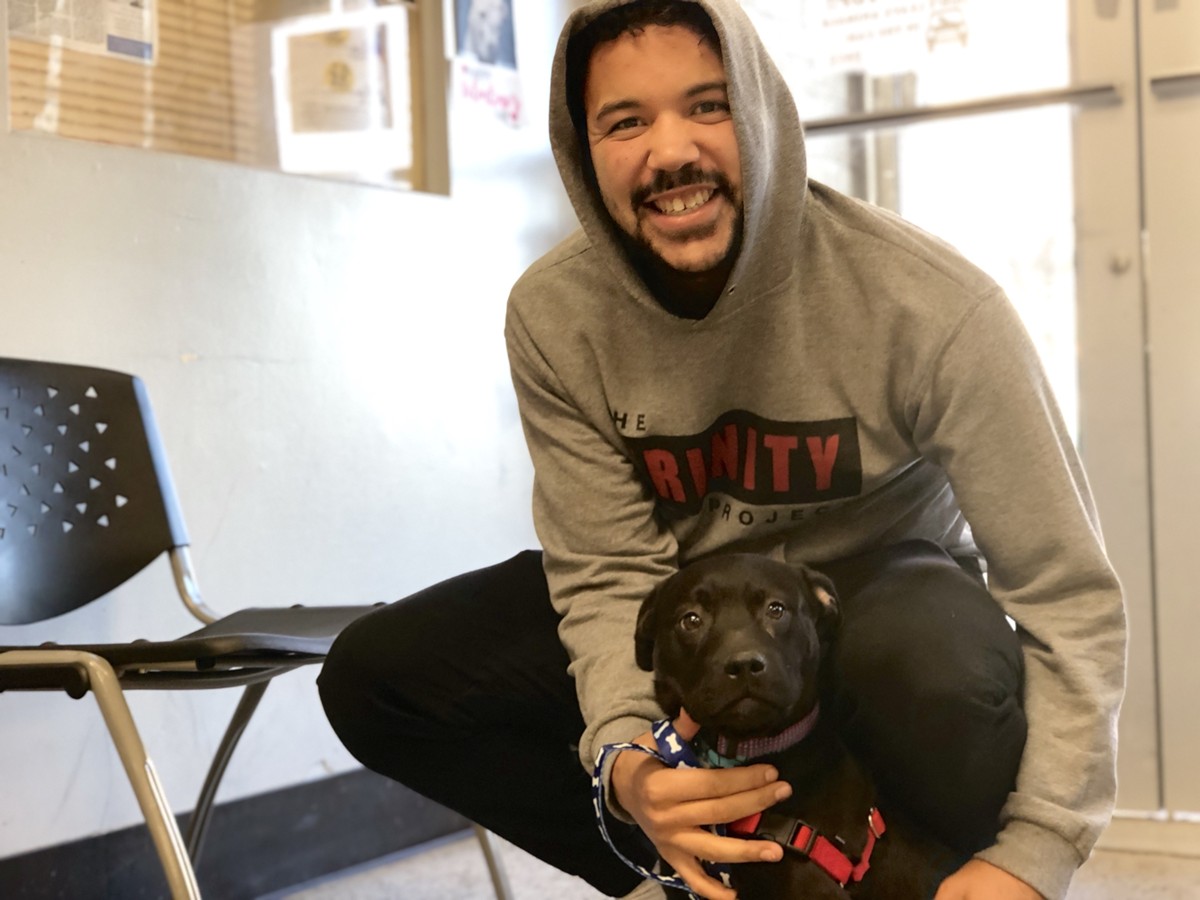Not long ago, the odds of Markus surviving were slim.
The black Labrador mix likely would have spent his final days in a filthy cage before being euthanized by the city of Detroit's underfunded, notoriously dysfunctional animal-control department.
Those dark days are coming to an end.
"Sweetheart, you're going home," a shelter worker says as she scoops Markus from his clean cage on a recent weekday.
With his tail wagging wildly, Markus greets his new owner, Joe Smith. The 27-year-old from Grosse Pointe Park decided while eating breakfast that he wanted to get his first dog. Later that day, Smith drove to Detroit Animal Care and Control's shelter, where he became attached to the perky dog staring at him through a cage.
"It was a great experience," Smith tells Metro Times. "We got blessed with this dog."
In 2013, when the city filed for bankruptcy, about 80% of the sheltered dogs were euthanized. Today, that rate has fallen to less than 20%, with a goal of reaching 10% by 2021. The average stay for a sheltered dog dropped from 45 days to 26 days. Over the Valentine's Day weekend, the city held an adoption event, My Furry Valentine, finding homes for nearly 100 dogs — a record for a three-day period in Detroit.
On the enforcement side, the city is responding more quickly to complaints about dangerous and neglected dogs. In 2013, the city had four animal-control officers and one investigator to cover 139 square miles and handle nearly 500 animal complaints in one week. Today, the department has 19 animal-control officers and six investigators. The department expanded its hours to 12 hours a day, seven days a week.
With a much larger staff, the city issued 740 tickets in 2019, a three-fold increase over the prior year.
Since the city emerged from bankruptcy, the department's budget has more than doubled. At the helm is the department's fourth director in four years, Mark Kumpf, who was hired in September and has three decades of experience working with animals for city and county governments.
Kumpf's passion for animals was on display during a recent adoption event. As he shows a Metro Times reporter the vastly improved shelter conditions — clean and uncramped cages, a full staff and healthy animals — he showers the dogs and cats with attention. Empathetic, smart, and bespectacled, Kumpf gingerly lifts a brown puppy from his cage and beams as the dog licks his face.
"Who's a cutie?" Kumpf asks the puppy.
Wiping off the puppy's hair from his black suit jacket, Kumpf says he's proud and eager to be a part of the department's turnaround.
"There is no other city that has committed so many resources and staff in such a short period of time as Detroit," Kumpf tells Metro Times. "This is an entirely new operation. They are doing everything they can to make this a fantastic operation."
Kumpf's career with animals began in the city of Norfolk in Virginia in 1989. For the next three decades, he helped care for animals and protect the public from dangerous, neglected dogs. He became an expert in dogfighting investigations and served as president of the National Animal Care and Control Association. At one point, he was a consultant to help investigators build a criminal case against then-NFL quarterback Michael Vick.
His passion for animals meant he took his work home with him — literally. He's had dogs, cats, snakes, big birds, spiders, rats, chinchillas, ferrets, "and anything else that came in and no one wanted."
Today, he has three dogs and a cat. Two of his dogs recently died.
"Every single day is exciting to me," Kumpf says. "There's a real opportunity to make a difference."
He'll have plenty of opportunities to make a difference in Detroit, home to roughly 150,000 dogs, many of which end up neglected, abused, and homeless. In the city's neighborhoods, vicious dogs had become all too common — the consequence of irresponsible pet owners and a city ill-equipped to handle an abundance of stray and neglected dogs, as documented by a Metro Times cover story in October.
In 2018, the city picked up 4,136 homeless dogs — an average of more than 11 a day.
Since 2005, at least six people have been mauled to death by dogs in Detroit. The victims ranged in age from three weeks old to 91 years old. Over the past three years, more than 1,250 dog bites have been reported in the city.
The wakeup call for Detroit came on Aug. 19, when 9-year-old Emma Hernandez was fatally attacked by three undernourished dogs that leaped over a neighbor's fence. Emma's father had repeatedly complained about the dogs getting loose, but city officials never took action.
Just eight days after Emma's death, two pit bulls slipped under a fence in Southwest Detroit and killed a small dog and injured his owner.
To reduce the number of attacks, Detroit City Council strengthened its dangerous animals ordinance last week by adding a provision called "Emma's Clause," which requires the Detroit Animal Care and Control Division to investigate and evaluate all complaints about dangerous animals.
"Our first priority is making sure animals do not pose a threat to human safety," Assistant Director of Animal Control Lori Sowle says in a written statement. "Increasing our enforcement is helping to send a message to dog owners that they will be held accountable for their pets."
Kumpf supports the strengthened ordinance and says the city is a lot quicker in responding to complaints.
"Response times were measured in days," Kumpf says. "Now they're measured in minutes."
Stay on top of Detroit news and views. Sign up for our weekly issue newsletter delivered each Wednesday.







